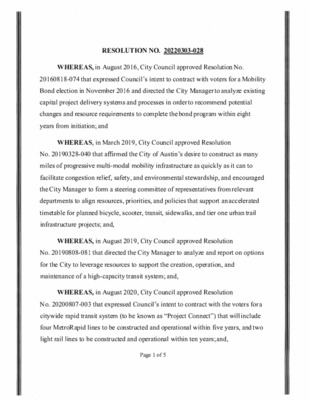Public Mobility Projects - Council Resolution — original pdf
Backup

RESOLUTION NO. 20220303-028 WHEREAS, in August 2016, City Council approved Resolution No. 20160818-07 4 that expressed Council's intent to contract with voters for a Mobility Bond election in November 2016 and directed the City Managerto analyze existing capital project delivery systems and processes in order to recommend potential changes and resource requirements to complete the bond program within eight years from initiation; and WHEREAS, in March 2019, City Council approved Resolution No. 20190328-040 that affirmed the City of Austin's desire to construct as many miles of progressive multi-modal mobility infrastructure as quickly as it can to facilitate congestion relief, safety, and environmental stewardship, and encouraged the City Manager to form a steering committee of representatives from relevant departments to align resources, priorities, and policies that support an accelerated timetable for planned bicycle, scooter, transit, sidewalks, and tier one urban trail and, infrastructure projects; WHEREAS, in August 2019, City Council approved Resolution N o. 20190808-081 that directed the City Manager to analyze and report on options for the City to leverage resources to support the creation, operation, and maintenance of a high-capacity transit system; and, WHEREAS, in August 2020, City Council approved Resolution N o. 20200807-003 that expressed Council's intent to contract with the voters for a citywide rapid transit system (to be known as "Project Connect") that will include four MetroRapid lines to be constructed and operational within five years, and two light rail lines to be constructed within and operational ten years; and, Page 1 of 5 WHEREAS, in August 2020, City Council approved Resolution No. 20200812-011 that expressed Council's intent to contract with the voters fora Mobility Bond election in November 2020, and directed the City Manager to analyze existing capital project delivery systems and processes in order to recommend potential changes and resource requirements to accelerate project delivery and maximize the number ofprojects to be completed within six years; and, WHEREAS, in October 2021, City Council approved Resolution No. 20211029-003 that directed the City Manager to review City Code, including, but not limited to, the Land Development Code, Criteria Manuals, and permitting procedures to identify impediments to the design, construction, implementation, and operation of Project Connect, and to present any Code amendments necessary to City Council no later than April 2022; and, WHEREAS, public mobility projects in the right-of-way offer tremendous community benefits, including improved multimodal access and accessibility for individuals with disabilities, enhanced life safety, greater and more equitable economic opportunity, improved air quality, and strengthened climate resilience, and, yet, often require waivers and variances from the Land Development Code; and, WHEREAS, reducing ambiguity and conflicts in the Land Development Code will reduce the number of waivers and variances that the Corridor Program Office and the Project Connect Office must seek and will support the efficient completion of these major mobility and transit projects in the timeframes that Council committed to the voters; and Page 2 of 5 WHEREAS, the Corridor Program Office, the Project Connect Office, and the Watershed Protection Department, with assistance from other departments, have reviewed existing City Code and identified the following challengesto successful design and construction of mobility and transit projects andassociated utility projects in the right-of-way: (a) The Land Development Code does not account for the unique nature of public mobility and associated utility projects in the right- of-way and the constraints of constructing long, linear projects; (b) The Land Development Code's definition of a site ischallenging for mobility and associated utility projects in the right-of-way, as it was primarily intended for lot-by-lot private development on zoned property; (c) Compliance with impervious cover limits is challenging for transportation construction projects because the area within a transportation right-of-way is often constrained and the existing roadway footprint frequently exceeds current impervious cover limits; (d) Mobility and associated utility construction projects in the right- of-way have limited land area available to provide adequate space for water quality controls within existing rights-of-way, and need additional options to address water quality requirements and the need for pollutant removal from stormwater; and, (e) A roadway project may consist of maintenance, such as curb and roadway repair, redevelopment, such as to address substandard Page 3 of 5 streets or safety issues, or a combination of the two, while code is written only for redevelopment and new development; NOW, THEREFORE, BE IT RESOLVED BY THE CITY COUNCIL OF THE CITY OF AUSTIN: Council initiates amendments to City Code Title 25 (Land Development Code) to address the staff-identified challenges to successful design and construction of public mobility and transit projects and associated utility projects in the right-of-way, including, but not limited to, amendments to: (1) Allow roadways sufficient maximum impervious cover limits for street cross-sections; (2) Clarify that zoning regulations (Chapter 25-2, Subchapter E) do not apply to linear mobility and transit projects located in the right of way; (3) Provide a definition of a site area for projects in the right-of-way; (4) Establish consistency in determining what construction in the right-of- way is considered maintenance versus redevelopment, and clarify that maintenance of existing roadways does not trigger water quality requirements; (5) Develop water quality calculations specific to projects in the right-of-way that cannot provide on-site water quality. Provide water quality credit for the removal of existing impervious cover, and allow payment-in-lieu of water quality treatment if other feasible solutions have been exhausted in all watershed regulation areas except the Barton Springs Zone; and, (6) Clarify that railways should have the same applicable environmental requirements as roadways. Page 4 of 5 The amendments shall be collaboratively developed by the relevant departments and offices, heard by the appropriate Boards and Commissions, and brought back to Council for consideration by May 19,2022. To the extent any of these challenges can be addressed administratively, such as via Criteria Manual updates, the City Manager is directed to do so and to report back to Council by May 19,2022. ADOPTED: Alarch 3 , 2022 ATTEST:_g-?Ct-4 ?Myria Rios City Clerk Page 5 of 5